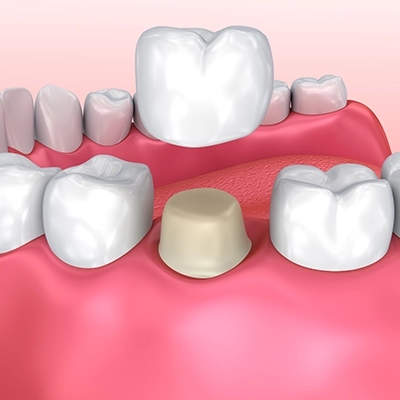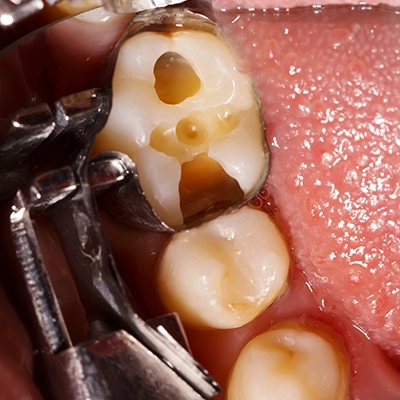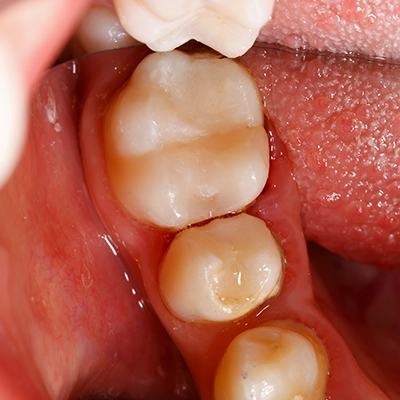LEARN ABOUT OUR SAFETY COMMITMENT
Menu
- New Patients:
- 727-219-1369
- Current patients:
- 727-494-7179
Menu
Restorative dentistry focuses on restoring the function of missing or damaged teeth, while cosmetic dentistry focuses on aesthetics. Some procedures provide both restorative and aesthetic benefits. Dental crowns fall into this category.
Dental crowns are one of the most popular restorative dental procedures. According to the American Academy of Implant Dentistry, over 15 million American adults have at least one crown.
Precision Dental in New Port Richey, FL specializes in dental crowns and other types of dental restorations. Here’s what you need to know about this procedure.
A dental crown is a restorative device designed to protect a damaged/decayed tooth from further damage/decay. It is also sometimes referred to as a “cap”.


There are several reasons that you may need a crown, including:
If you have a cavity that is too large for a dental filling, or the tooth is severely damaged, and the root is still attached, a crown may be used to salvage the structure of the tooth.
Root canal treatment involves removing the tooth pulp, which can weaken the structure of the tooth. A crown can restore the appearance and functionality of the tooth.
A crown can be used to protect a tooth that is cracked or chipped, preventing bacteria from getting in and infecting the tooth pulp.
If you have a missing tooth replaced with a dental implant, a crown may be used to replace the visible portion of the tooth.
If your teeth are stained/discolored or have an irregular shape, a dental crown can be used to improve the aesthetics.
A dental bridge is used to replace several missing teeth in a row. A dental crown can be used to secure the bridge to the natural teeth or to implants on either side of the gap.
A dental crown is an effective solution for many dental issues. The benefits of dental crowns include

On average, crowns last 5 to 15 years- but may last 20+, with proper care and maintenance. According to research, dental crowns have a high success rate compared to other dental restorations or no treatment.
The cost of a crown ranges from around $800 to $2,500 depending on several factors, including:
Most of the time, dental insurance will cover a portion of the dental crown procedure- unless the primary purpose is cosmetic. Our office staff will work with your insurance provider to determine your coverage. If you do not have insurance or do not cover the procedure, we offer financing options.
Depending on your preferences and needs, there are several options for crown materials, including:
These are pre-fabricated and typically used temporarily while the permanent, custom crown is being fabricated. This type of crown is also often used on primary teeth in pediatric patients to protect it from damage. When the tooth comes out, the crown does too. The primary reason these are used in pediatric patients is because it is more cost effective and only requires one visit to the dentist.
Metal crowns are made from gold, platinum, or base-metal alloys. Metal crowns are strong and last the longest compared to other materials. This type of crown rarely chips or breaks. The primary disadvantage is the color. This type of crown is often a good choice for molars since they are not visible.
A PFM crown can be matched to the neighboring teeth, but experience more wear and tear compared to metal or composite resin. In addition, the porcelain may chip or break. Due to the porcelain overlay, this type of crown looks similar to natural teeth. The disadvantage is that the metal may show through at the gumline, especially if your gums are receding. This type of crown is a good option for either front or back teeth, as well as long dental bridges.
Composite resin crowns are the least expensive compared to the other types of custom dental crowns. The primary disadvantage is that they wear down quickly and are more likely to fracture or break than PFM crowns.
This type of crown provides the best natural match than other types and is best for patients who have metal allergies. This type of crown can be used on the front or back teeth.
A dental crown is a permanent, non-removable restoration. Therefore, it does not require any special care considerations. You simply brush and floss as usual and visit the dentist every 6 months for an exam and cleaning. If you wish, you may also use an alcohol-free mouthwash.
Most of the time, dental crowns require 2 or more appointments. However, there are some cases where a same-day dental crown is appropriate. Here’s what to expect with each procedure:
Traditional crowns usually take 2 or more appointments. During the first one, the dentist will perform a comprehensive exam and take images of the affected tooth. If needed, additional work will be completed and impressions will be made, which will be sent to the dental lab for the fabrication of your crown. This usually takes about 2 weeks. If necessary, a temporary crown will be placed.
When your crown is ready, you will return to have it placed. The dentist will remove the temporary crown and clean the tooth. Then, the permanent one will be fitted and cemented in place.
For same-day dental crowns, the entire process can be completed in one day. The dentist will perform a comprehensive exam and cleaning. Then, an intraoral camera will be used along with CAD software to create a 3D image of the tooth. Once this is done, the image will be entered into the CEREC machine which will fabricate the crown. It usually takes a couple of hours for the crown to be made. You can run errands or even go to work while you wait, if you wish. Once the crown is ready, the dentist will prep the tooth and place the crown, which usually takes about an hour.
If you have a tooth that is severely damaged or decayed, you may need a dental crown to protect it. Schedule your consultation with the team at Precision Dental today. We are conveniently located at 9020 Rancho del Rio Drive. Our office hours are Monday through Friday from 9:00 AM to 5:00 PM and Saturday from 9:00 AM to 1:00 PM. If you have a dental emergency, contact us and we will get you in as quickly as possible.
If you have any questions about dental crowns or other restorative procedures, please let us know. We will be happy to address them. Below are some of the frequently asked questions at Precision Dental.
No, the process of getting a dental crown is not painful. You will be given local anesthesia to numb the area while the work is being done. You may have some mild discomfort as the anesthesia wears off. However, you should not feel any pain.
You may have mild discomfort as the anesthesia wears off and you get used to having the crown on the tooth. However, you should not have any significant pain. If you do, schedule an appointment right away.
A dental crown is a cap that is placed over a damaged tooth to protect it from further damage and/or decay.
Friday (Good Friday)
9 AM–2 PM Hours might differ